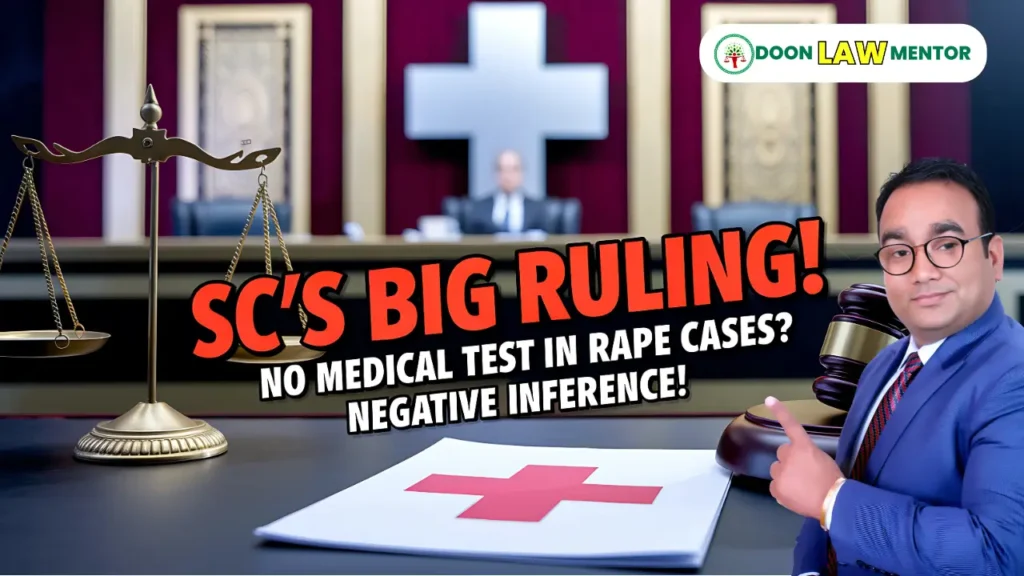The Supreme Court ruled that rape victim refusal for medical exam can raise negative inferences against her. In State of Himachal Pradesh v Rajesh Kumar (2025 SC), the Court emphasized the importance of medical evidence in rape cases. Learn how this judgment impacts legal proceedings, victim credibility, and judiciary exam preparation. Stay updated with the latest legal insights!
Table of Contents
Introduction
The Supreme Court of India has reiterated that the refusal of an alleged rape victim to undergo a medical examination can lead to negative inferences against her. This landmark ruling was delivered in the case of State of Himachal Pradesh v Rajesh Kumar (2025 SC), where the Court emphasized the critical role of medical evidence in establishing the credibility of rape allegations. The judgment has significant implications for legal proceedings in rape cases, particularly concerning the weightage given to medical examinations and victim testimonies.
Case Background: State of Himachal Pradesh v Rajesh Kumar
The case dates back to 2007, when the father of the alleged victim lodged an FIR accusing Rajesh Kumar of raping his daughter. The incident allegedly occurred when the parents were away, and the accused forcibly engaged in sexual intercourse with the prosecutrix.
Refusal for Medical Exam and Hostile Witnesses
- The prosecutrix was taken to the Regional Hospital, Hamirpur, where she was found to be of unsound mind due to her lack of cooperation during the medical examination.
- She was referred to RPMC Hospital, Tanda (Dharamshala), for further examination by a gynecologist and psychiatrist. However, her father refused to allow any medical examination.
- During the trial, the mother of the prosecutrix turned hostile, and the father provided evasive statements, further weakening the prosecution’s case.
Trial Court and High Court Decisions
- The trial court convicted the accused based on the available evidence.
- However, the High Court acquitted the accused, citing the lack of medical evidence and the prosecutrix’s refusal to cooperate with medical examinations.
Supreme Court’s Observations
The Supreme Court bench, comprising Justice Surya Kant and Justice NK Singh, upheld the High Court’s decision and made the following key observations:
Importance of Medical Examination in Rape Cases
- The Court emphasized that medical examination is a critical component in rape cases, as it provides objective evidence to corroborate the victim’s testimony.
- Refusal to undergo a medical examination can raise adverse inferences, as it deprives the court of crucial evidence. For more on the importance of medical evidence in criminal cases.
Reference to Dola v. State of Odisha (2018)
- The Court referred to its earlier judgment in Dola v. State of Odisha (2018), where it was held that non-cooperation in medical examinations can weaken the prosecution’s case.
- The Court reiterated that the burden of proof lies on the prosecution, and the absence of medical evidence can create reasonable doubt.
Credibility of Testimonies
- The Court noted that the prosecutrix and her parents did not fully cooperate with the medical staff, which adversely impacted the credibility of their version of events.
- The High Court had observed that the prosecutrix was not mentally unsound, as she was able to comprehend and answer questions during cross-examination.
Legal Implications of the Judgment
This judgment has significant implications for rape cases in India:
Role of Medical Evidence
- Medical evidence remains a cornerstone in establishing the veracity of rape allegations.
- Courts may draw negative inferences if the victim refuses to undergo a medical examination, as it hampers the collection of objective evidence. Learn more about the role of medical evidence in criminal trials from SCC Online.
Witness Credibility
- The conduct of the victim and witnesses during the investigation and trial can influence the court’s decision.
- Hostile witnesses and evasive statements can weaken the prosecution’s case. For insights into witness credibility, refer to this article by Manupatra.
Burden of Proof
- The judgment reinforces the principle that the burden of proof lies on the prosecution to prove the accused’s guilt beyond a reasonable doubt.
- Lack of medical evidence can create reasonable doubt, leading to acquittal.
Challenges and Criticisms
While the judgment underscores the importance of medical evidence, it also raises certain concerns:
Victim Trauma and Cooperation
- Rape victims often suffer from trauma and may be unwilling or unable to cooperate with medical examinations.
- Courts must balance the need for medical evidence with the victim’s mental and emotional state.
Limited Jurisdiction in Acquittal Cases
- The Supreme Court highlighted its limited jurisdiction to interfere with orders of acquittal, emphasizing the need for compelling reasons to overturn such decisions.
Conclusion and Key Takeaways
The Supreme Court’s ruling in State of Himachal Pradesh v Rajesh Kumar (2025 SC) reaffirms the critical role of medical evidence in rape cases. While the refusal to undergo a medical examination can raise adverse inferences, courts must also consider the victim’s trauma and mental state. This judgment serves as a reminder for legal professionals and judiciary aspirants to understand the nuances of evidence collection and witness credibility in criminal cases.
Call-to-Action (CTA):
“Stay updated with the latest legal judgments and insights. Follow Doon Law Mentor for expert guidance on judiciary exams and legal career preparation!”
FAQs Section
- What did the Supreme Court rule in State of Himachal Pradesh v Rajesh Kumar?
The Court ruled that refusal by an alleged rape victim to undergo a medical examination can raise negative inferences against her. - Why is medical examination important in rape cases?
Medical examination provides objective evidence to corroborate the victim’s testimony and is crucial for establishing the facts of the case. - What happens if a rape victim refuses a medical examination?
Courts may draw adverse inferences, as the absence of medical evidence can weaken the prosecution’s case. - Can hostile witnesses impact a rape case?
Yes, hostile witnesses and evasive statements can undermine the credibility of the prosecution’s case. - What was the role of Dola v. State of Odisha in this judgment?
The Supreme Court referred to this case to reiterate that non-cooperation in medical examinations can lead to adverse inferences. - What are the challenges in relying on medical evidence in rape cases?
Victims may be unwilling to undergo medical examinations due to trauma, and courts must balance the need for evidence with the victim’s mental state.
#SupremeCourtJudgment, #RapeCaseLaws, #MedicalExamination, #LegalUpdates, #IndianJudiciary, #CriminalLaw, #JudicialDecisions



